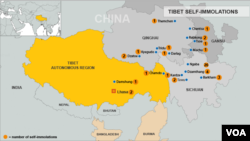Two more Tibetans have set themselves on fire to protest China's policies in Tibet.
The latest in a long series of self-immolations took place Monday outside the gates of the Kirti Monastery in China's Sichuan Province - an area Tibetans call Ngaba.
Sources tell VOA's Tibetan Service two men set themselves ablaze, calling for Tibet to be freed from Chinese rule and for the return of the Dalai Lama. Security forces put out the flames and took the men away.
The condition of the two protesters is not known.
State Department spokeswoman Victoria Nuland said Monday she had not been informed of the self-immolations but again called on China to respond to Tibetan concerns.
"You know that whenever we see these tragic incidents, we again call on China to meet the legitimate grievances of the Tibetan people within China, to protect their human rights, to protect their way of life and to work on these issues through dialogue," said Nuland.
Dozens of Tibetans have now set themselves on fire since 2009 to protest China's policies in Tibet. The vast majority of incidents have taken place since March of last year to protest what Tibetans say is repression by China, which denies the accusations.
Most of the incidents that have taken place occurred in Tibetan-populated areas of southwestern China. There have also been a few in the Tibet Autonomous region.
The latest in a long series of self-immolations took place Monday outside the gates of the Kirti Monastery in China's Sichuan Province - an area Tibetans call Ngaba.
Sources tell VOA's Tibetan Service two men set themselves ablaze, calling for Tibet to be freed from Chinese rule and for the return of the Dalai Lama. Security forces put out the flames and took the men away.
The condition of the two protesters is not known.
State Department spokeswoman Victoria Nuland said Monday she had not been informed of the self-immolations but again called on China to respond to Tibetan concerns.
"You know that whenever we see these tragic incidents, we again call on China to meet the legitimate grievances of the Tibetan people within China, to protect their human rights, to protect their way of life and to work on these issues through dialogue," said Nuland.
Dozens of Tibetans have now set themselves on fire since 2009 to protest China's policies in Tibet. The vast majority of incidents have taken place since March of last year to protest what Tibetans say is repression by China, which denies the accusations.
Most of the incidents that have taken place occurred in Tibetan-populated areas of southwestern China. There have also been a few in the Tibet Autonomous region.
